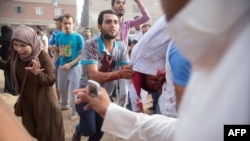Egyptian officials said at least six people have been killed in Cairo during clashes between police and supporters of ousted Islamist President Mohamed Morsi.
The fighting erupted Friday during an Islamist protest march following morning prayers in the Talibiya neighborhood near the Giza pyramids, said police.
There are also reports of protests in the town of Nahya, an Islamist stronghold on the outskirts of the Egyptian capital.
The protests occurred on the important holiday of Eid al-Fitr, which marks the end of the Muslim holy month of Ramadan.
Witnesses said protesters were trying to block traffic on a main boulevard near the pyramids, but police prevented them from reaching the area. The Muslim Brotherhood group reportedly urged its supporters to demonstrate against the government to mark the end of Ramadan.
Egypt's interior ministry claimed that armed individuals fired live rounds at police from a bridge overlooking the street where clashes took place. VOA could not independently confirm the source of the gun fire.
Egyptian security forces appeared to be on alert in many places. Police set up checkpoints on main roads and bridges and searched suspicious vehicles.
The Egyptian government has outlawedMorsi's Muslim Brotherhood and has thrown thousands of its supporters in prison.
Morsi was ousted by the military following large popular protests against his rule. An operation to disperse two protest camps of his supporters in August 2013 provoked a simmering conflict between the Muslim Brotherhood and the military.
His supporters have held regular protests since his ouster, though there have been fewer following an intense security crackdown.
Since then, however, there has been an increasing number of deadly militant attacks, mostly on official targets, throughout the country.
Hilal Khashan, who teaches political science at the American University of Beirut, told VOA Egypt has fought Islamic militants several times since the 1950s, but that tackling just the security conflict without solving underlying political tensions will leave the country fragile:
"If the government is eventually successful in bringing about calm, be it artificial or real, I think the country will pay a very heavy toll for restoring calm," he said.




